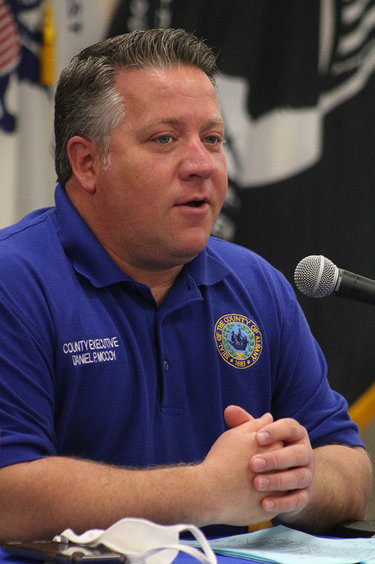McCoy predicts: Full opening may come in June
ALBANY COUNTY — If current COVID-19 trends hold, Albany County Executive Daniel McCoy thinks the Capital Region may begin Phase 3 and finally Phase 4 of reopening ahead of schedule.
But he also cautioned at his Sunday press briefing, “The virus is still here.” And he continued to urge residents to wash their hands, stay six feet from others, and wear masks in public.
As New York State’s numbers for hospitalizations and deaths trend down, Governor Andrew Cuomo announced some statewide openings in the last few days. Of the state’s 10 regions, New York City, the epicenter of the pandemic, is the only region not reopening but it is slated to begin Phase 1 on Monday.
On Friday, Cuomo amended an earlier executive order so that necessary, in-person special education instruction will be allowed in New York State this summer. Other summer-school classes are online.
“I was glad to get speech and OT [occupational therapy] moved into Phase 2,” said McCoy on Sunday.
On Saturday, Cuomo announced he was accelerating the opening of temples, mosques, and churches. Houses of worship in Phase 2 regions can open to 25 percent occupancy of the building.
Cuomo said he spoke to a minister who said 25 percent occupancy is better than zero. “He said, ‘But 25 percent occupancy, then I have to have four services to get everyone in.’ Then he said, ‘Well you know, I have to give the same sermon four times ... Hopefully by the fourth time I get it right,” Cuomo reported.
The governor urged, “Be smart. It does not mean you go to a temple or a mosque and you sit right next to a person. You have to socially distance. Watch on the entranceway and on the exit way when people tend to congregate going through the entrance or the exit.”
On Sunday, Cuomo announced that outdoor, socially-distanced graduations of up to 150 people will be allowed beginning June 26, subject to any outbreaks or significant changes in the metrics. He had announced earlier that schools could hold drive-through ceremonies, or ceremonies at drive-in theaters.
On Saturday, Cuomo also went over new information from global health experts. “The virus can live in the air for three hours, which is actually frightening when you think about it,” said Cuomo. “It means if I am infected and I am speaking and we have air molecules that I am dispersing, they could linger for three hours.”
Cuomo also reported, “You can still get the virus from a surface, but the virus does not live as easily or as long on surfaces as they originally thought.”
He went on, “They originally said, if you were infected, you cannot be re-infected. That was theoretically a way for the workforce to go back to work … That’s wrong. Infected people may be able to get infected.”
“The numbers are good”
The statewide plan had allowed two-week intervals between each of four phases to be sure the coronavirus disease 2019 wasn’t spiking. Control rooms, made up of local leaders and state officials, are to talk daily to gauge how metrics are unfolding.
Phase 3 in the eight-county Capital Region, which was originally scheduled to start on June 17, includes restaurants and hotels while Phase 4, originally scheduled to start on July 1, includes education, arts, entertainment and recreations.
“The numbers are good,” said McCoy on Sunday. “And, if it continues this way with all the protests going on, there’ll be no reason to wait till July 1 to get into Phase 4.”
A regional plan provides protocols for each business, based on state guidelines that are regularly updated.
According to an analysis presented last month by Kevin O’Connor, the county’s director of economic development, Albany County has 21,309 jobs, or 8.7 percent of all its jobs, that fit Phase 1 categories.
The majority of Albany County jobs — 123,663 jobs or 50.26 percent — fall into Phase 2 categories. Phase 3 jobs, for food services and accommodations, number 14,453 or 5.9 percent in Albany County. And, the last to reopen, Phase 4, number 25,411 or 10.4 percent in Albany County.
People with “essential jobs” — government, health care, information, utilities, agriculture, and mining among them — have been working all along. In Albany County, there are 59,558 essential jobs or 24.4 percent of all jobs.
McCoy on Sunday announced two women in their seventies, both with underlying health conditions, have died of COVID-19, bringing the county’s death toll to 115.
Albany County now has 1,792 confirmed cases of COVID-19 with 606 county residents under mandatory quarantine and six under precautionary quarantine.
The five-day average for new daily positives is now down to 9.
So far, 4,849 county residents have completed quarantine, with 1,457 of them having tested positive and recovered.
Twelve county residents are hospitalized with three in intensive-care units. That brings the county’s hospitalization rate down to 0.66 percent.
McCoy termed these “very, very low trends.”
The numbers remain low, he noted, despite returning workers getting tested as well as the protesters and first responders in recent rallies getting tested.
McCoy again urged those who had congregated at protests to get tested for COVID-19. Seventy-eight were tested last week and another testing opportunity is being offered — on Wednesday, June 10, from 9 to 11 a.m. at Capital South Campus, 20 Warren Street, in Albany.
“If you have insurance, great. If not, we’ll pay for it,” said McCoy.
He said that he hopes results from the 78 tests will be back by Tuesday, giving some indication if the virus spread through the protests.
McCoy also urged those who are stressed by recent and ongoing protests — first responders, shop owners whose stores have been damaged, and protesters themselves — to call the county’s mental-health helpline at 518-269-6634. The free service is available seven days a week from 8 a.m. to 8 p.m. Anyone experiencing a psychiatric emergency should still call the Albany County Mobile Crisis Team at 518-549–6500.
Ever since the county began gathering data on residents infected with COVID-19, McCoy has stressed how many in the age group of 20 to 29 years have been infected. Last time, he noted that the young age group was “neck and neck” with the 50-to-59 age group.
McCoy said on Sunday that those in the 20-to-29 group have now surpassed all others.
“You don’t have signs or symptoms,” he said. But COVID-19 could unwittingly be spread to someone with underlying health conditions who could die of the disease.
“Be careful,” said McCoy.
“Challenging”
On Saturday, McCoy said, he visited the South End neighborhood where he grew up, which was hard hit by the protests.
“It’s challenging right now,” he said.
McCoy shared some of the questions he was asked along with his responses.
He was asked why people had had to stay at home and responded, “I’m not a scientist.” He said of COVID-19, “It’s there; it’s real.”
McCoy said he had to take guidance from the governor and the control room. He went on, “We have to do this together collectively … That’s one of the reasons our numbers were so low. We did the right stuff in Albany County. We continue to do the right stuff.”
He was also asked: Why did I have to go to work for 13 weeks when others sat around and did nothing?
McCoy’s answer: “A: Thank God you’ve got a job and B: Just be glad you’re healthy.”
Asked why he didn’t hold a press briefing on Saturday, McCoy said that, in 13 weeks, his staff hadn’t had a day off. “You can see the fatigue,” he said. “People are getting burnt out around me.”
He went on, “I’m not going to call everyone down here to do a briefing if our numbers are going up 6, 7, or 8 … I want to bring people here to give out good guidance that we get so, if the governor changes something or the control room gives us information and, unfortunately, if someone passes away, we’ll have a press conference.”
He also said, “As things open up, more services are going to be needed for the county. I’ve got a budget I need to deal with.”
With the depressed economy, McCoy said, if the state doesn’t get bailed out by the federal government, expenses would likely be pushed down to the counties.
McCoy said he was getting calls from Guilderland and Colonie about shops being boarded up. Growing up in Albany’s South End, McCoy said, he thought of boarded-up stores as the norm.
“It’s a little shocking to people outside certain areas of the city … It’s kind of an eerie feeling,” he said.
McCoy also said, “We’ll get through this by leaning on each other, understanding each other a little bit better.”



